 Petzlover
Petzlover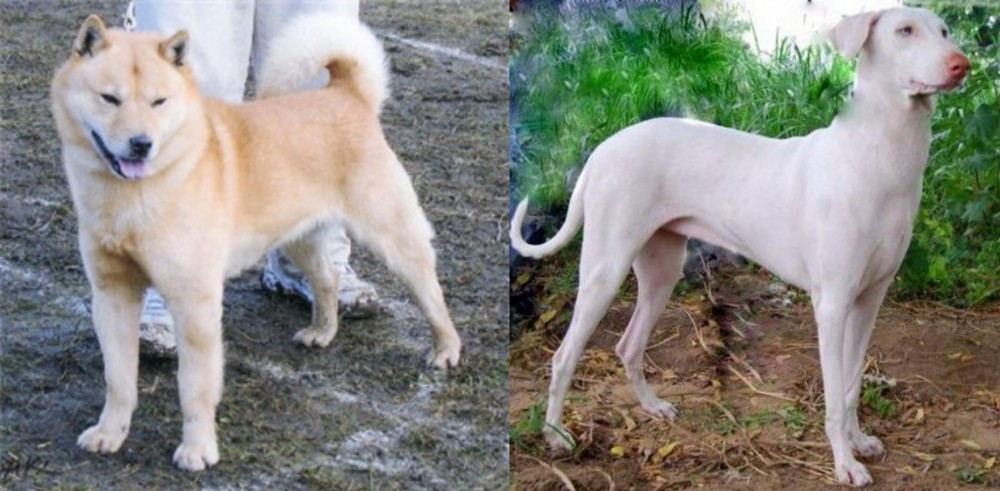 Hokkaido is originated from Japan but Rajapalayam is originated from India. Hokkaido may grow 24 cm / 9 inches shorter than Rajapalayam. Hokkaido may weigh 24 kg / 53 pounds more than Rajapalayam. Hokkaido may live 3 years more than Rajapalayam. Both Hokkaido and Rajapalayam has almost same litter size. Hokkaido requires Moderate Maintenance. But Rajapalayam requires Low Maintenance
Hokkaido is originated from Japan but Rajapalayam is originated from India. Hokkaido may grow 24 cm / 9 inches shorter than Rajapalayam. Hokkaido may weigh 24 kg / 53 pounds more than Rajapalayam. Hokkaido may live 3 years more than Rajapalayam. Both Hokkaido and Rajapalayam has almost same litter size. Hokkaido requires Moderate Maintenance. But Rajapalayam requires Low Maintenance
 The Hokkaido breed originates in Japan and is also called Ainu-ken, Ainu dog, Seta or Do-ken. The last being its common name in Japan. It is believed that the Hokkaido is descendent from the Japanese Matagi-ken, meaning hunting dog, deer hunting dog or bear hunting dog. It was the Ainu peoples that brought the breed to Tohoku. Many years later the Yayoi people brought in another breed of hunting dogs. These breeds were in isolation for most of their existence and therefore they had little influence on the further development of other breeds.
The Hokkaido breed originates in Japan and is also called Ainu-ken, Ainu dog, Seta or Do-ken. The last being its common name in Japan. It is believed that the Hokkaido is descendent from the Japanese Matagi-ken, meaning hunting dog, deer hunting dog or bear hunting dog. It was the Ainu peoples that brought the breed to Tohoku. Many years later the Yayoi people brought in another breed of hunting dogs. These breeds were in isolation for most of their existence and therefore they had little influence on the further development of other breeds.
The Ainu dog was used in searches as well as hunting and became in 1937 “a rare species in Japan that is protected by law”. At that time the Official Name of the breed was set in place as Hokkaido-Inu. But they are still called Hokkaid0-Ken by most Japanese people.
This is a very rare breed of dog. It is hardly known outside of Japan and in country there are about ten to twelve thousand remaining. Of those about nine hundred to one thousand are registered in Japan every year. It is guessed that less than thirty exist outside Japan.
The Hokkaido breed is the oldest Japanese breed of dogs. Today they are great indoor companions, loyal and friendly. Most people in Japan still call them the Ainu dog.
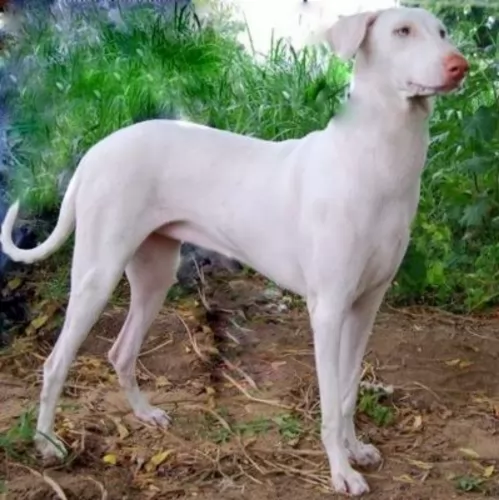 The Rajapalayam dog hails from India, from the small town of Rajapalayam in Tamil Nadu.
The Rajapalayam dog hails from India, from the small town of Rajapalayam in Tamil Nadu.
Known also as the Poligar Hound, this Indian Sighthound has been the companion of royalty in Southern India.
Though the breed dates back a few hundred years, the developers of the breed brought about an albino dog. This Indian breed dog is almost on the verge of extinction. This is a pity as he is a splendid dog. Breeding centers have been set up to prevent the dog disappearing altogether.
 The Hokkaido breed is medium in size but very strong in build. Dogs bred outside Japan tend to be smaller. They have wide, deep chests, and long thick coats compared with Japanese dogs from other breeds. It is a double coat of long fur on top and short softer fur underneath for the second coat. Their ears are triangular and small while their eyes have a triangle outline. The double coat could be sesame, white, red, black, black and tan and wolf-gray.
The Hokkaido breed is medium in size but very strong in build. Dogs bred outside Japan tend to be smaller. They have wide, deep chests, and long thick coats compared with Japanese dogs from other breeds. It is a double coat of long fur on top and short softer fur underneath for the second coat. Their ears are triangular and small while their eyes have a triangle outline. The double coat could be sesame, white, red, black, black and tan and wolf-gray.
They are an intelligent breed with an impulsive gait. They are alert, courageous and suspicious. They were used for guarding the city gates. Their skull is flat and broad and the tongue, like the chow chow, is blueish. black. With a black nose and a wedge shaped muzzle, the Hokkaido is a handsome dog. His lips are with black and tight. High set, thick tail over the back or slightly curved to the side.
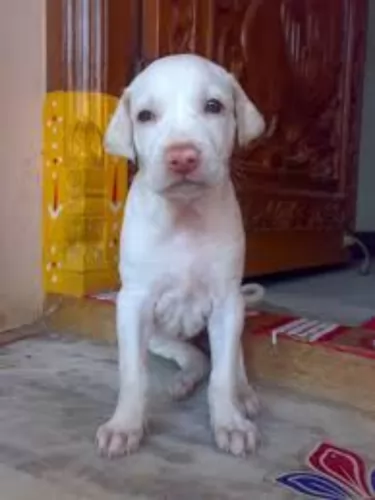 This is a large dog, graceful and elegant standing at between 65–75cm and weighing 22 to 25kg.
This is a large dog, graceful and elegant standing at between 65–75cm and weighing 22 to 25kg.
This is a hound dog, lean and muscular and will rely on good exercise to keep him in tip top working condition.
He is somewhat heavier than other sighthounds with a deep chest and long straight legs. He is a low maintenance dog with the white coat being short and fine. The ears are floppy ad the tail is slim and long and sometimes held up and curved.
The Rajapalayam has always been used for hunting wild boar, and today he makes a good guard- and watchdog. He needs a lot of space and exercise and isn’t suited to living in small spaces in the city.
He is a loving dog and becomes loyal and devoted towards his owner, being essentially a one-person dog. They tend to be aggressive and aloof with strangers.
Training and socialization will be important for this intelligent dog if you want him to behave around people. He doesn’t particularly get on well with other pets in the home, but training and socialization can change this.
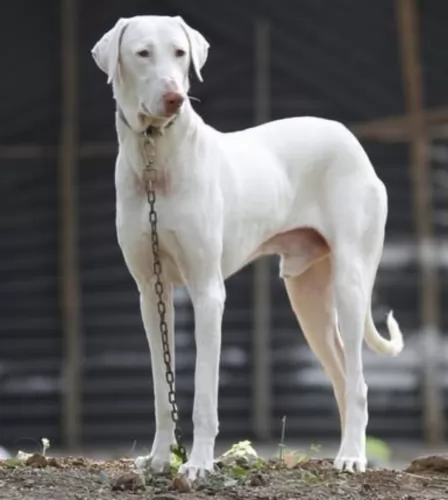 A Rajapalayam dog has always been a hunter and this makes him an excellent watchdog, always on the look out for intruders.
A Rajapalayam dog has always been a hunter and this makes him an excellent watchdog, always on the look out for intruders.
The Rajapalyam has always been a dog deeply attached and loyal to his owners.They are good family companions and pets and with so many good characteristics, one hopes that this dog will still be around for a long time.
 Often breeds that are isolated like the Hokkaido, have a pretty good health history but there are a few serious issues that they face.
Often breeds that are isolated like the Hokkaido, have a pretty good health history but there are a few serious issues that they face.
1/3 of all dogs have it while 2/3 are carriers. This disease is congenital and there is no cure. It affects the sclera, retina and choroid. It can be mild or it can cause blindness.
Affecting joints and cause arthritis and lameness.
Floating kneecap – not as prevalent here as in smaller dogs.
Could be mild or serious. Could require a pacemaker.
Seizures of an unknown origin. Can be treated with medication not cured.
Excessive, uncontrollable urge to drink large amounts of fluid without a stimuli.
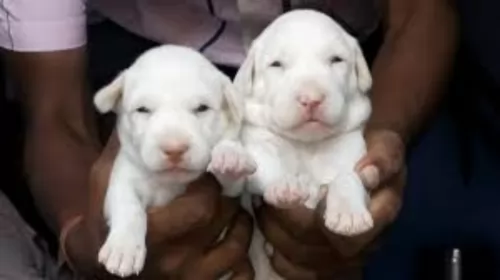 The Rajapalayam isn’t a fragile dog, and he can live to 10, 11 or 12 years of age. There are always a few things to look out for with him. With white dogs, there is always a high incidence of deafness. Puppies born with blue eyes are often deaf.
The Rajapalayam isn’t a fragile dog, and he can live to 10, 11 or 12 years of age. There are always a few things to look out for with him. With white dogs, there is always a high incidence of deafness. Puppies born with blue eyes are often deaf.
White coated dogs, because of the piebald gene, are often affected by deafness. The piebald gene is because of an absence of melanocytes. These are cells which create pigment. When a dog is born without the genes to create melanocyte cells, a white hair coat and sometimes blue eyes are the result.
There are also skin problems associated with these all white dog breeds such as mange and dermatitis. Check him over for ticks and fleas.
 The puppy needs about 300 -400 calories per day in 3-4 servings per day
The puppy needs about 300 -400 calories per day in 3-4 servings per day
The adult dog needs about 250-350 calories a day to maintain good weight and health. Feed 2-3 times per day.
Strong, stamina
These dogs love exercise and definitely need it. They will get to be anxious or bored if they don’t get enough exercise. A back yard run is fine but remember that the Hokkaido is a jumper and make sure your fence is at least six feet high. They need daily walks even if you have a fenced yard. Martindale collars or harnesses are needed when walking them.
These dogs love games and competitive activities. They are good at hunting and guarding of course. There are other activities they can excel at and enjoy jogging, biking with you, and hiking. In competition they enjoy and are good at agility, flyball, lure coursing, rally, weight pull, dock diving, and obedience. They do not participate in confirmation.
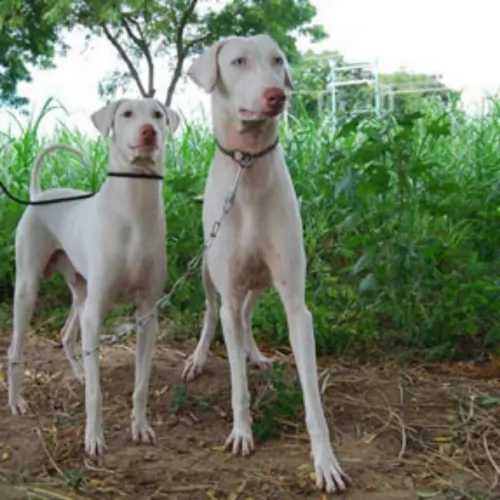 The short coat does shed so he will need to be brushed once or twice a week.
The short coat does shed so he will need to be brushed once or twice a week.
You will also need to follow a regular grooming program with this dog, checking inside his ears for infection, checking his eyes for discharge and checking inside his mouth for bad, rotting teeth. Teeth- and gum disease aren’t just about losing a tooth - bad teeth and gums can cause a host of health issues for other body parts like the heart and kidneys.
His toe nails too wll require clipping to prevent splitting and chipping.
Provide your pet with lots of exercise – a walk every day, a run in the park off his leash as well as ball and frisbee games.
You can’t ever become lax with giving your pet good food. Good, wholesome food promotes health and longevity.
There are some good commercially manufactured dog foods which are wonderfully convenient – you just want to be sure its the high quality ones full of vitamins and minerals.
Also, provide him with uncomplicated, home-made dog food too. Boiled chicken, brown rice or pasta, sweet potatoes, carrots and spinach, all chopped up and mixed in twice a week with the dry kibble will ensue health and contentment.
Try and add some raw meat in as well. This simple diet plan will be gentle on your pet’s digestive system.
Make sure he always has a bowl of fresh, cool water available to him.